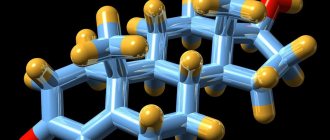Article 2 (Calculation of daily iodine intake)
A little about the purpose of iodine in the life of the body. Iodine is an integral part of thyroid hormones. Entering the body with food and water, iodine is actively captured by the thyroid gland from the blood and is used to form hormones that are involved in the development and regulation of: the psyche and nervous system, thyroid gland, cardiovascular system, gastrointestinal tract, reproductive function, skin and hair, musculoskeletal system. For the formation of a sufficient amount of hormones, a sufficient supply of iodine in the body is also necessary.
World medicine has recognized iodine deficiency as a major threat to human intelligence and development. It is a daily microdose of iodine that ensures a person’s ability to learn, determines the success of any activity and is the basis for the development of other abilities.
Each area has different iodine content in food and water. Almost throughout the entire territory of Russia there is an endemic iodine deficiency of varying severity. Iodine deficiency is most pronounced in mountainous and foothill regions (North Caucasus, Altai, Siberian Plateau, Far East). This is not the case all over the world. The average daily iodine consumption in different countries of the world is shown in table No. 1
Table 1. Average daily iodine intake in various countries.
| Country (literary source) | Average daily iodine intake, mcg/person/day | Range of average daily iodine intake, mcg/person/day |
| Australia (Eastman, 1993) | 200 | |
| Bulgaria (Gutekunst et al, 1992) | 20-60 | |
| Germany (Pfaff et al., 1995) | 76 | 55-100 |
| Denmark (Lamberg et al, 1993) | 300-350 | 300-687 |
| Spain (Muros et al, 1992) | 286,4-11344 | |
| Canada (Dussault, 1993) | 1000 | 60% - salt; 25% - dairy products |
| China (Hou et al, 1997) | 166 | 139-208 |
| Korea (Kim et al, 1998) (Moon et al, 1999) | 61-4086 1295-2744 (breastfeeding women) | |
| UK (Lazazus, 1993) (Nelson et al, 1985), (Lee et al, 1994) | 225 173 166 | Men in summer - 195, in winter - 306 Women in summer 126, in winter - 236 140-1000 |
| Poland (Gembick, 1993) | 125-250 | |
| Russia (MU 2.3.7.1064.01.2001) | 40-80 | |
| USA (Allegrini et al, 1983) (Pino et al, 1993) | 554 | 310-778 1 70-700 |
Based on the above data, it is clear that Russian residents need an additional source of iodine.
Iodine consumption standards. The daily iodine requirement depends on age and physiological state. The World Health Organization (WHO) recommends the following daily intakes of iodine:
Table 2. Physiological daily requirement for iodine (in micrograms)
| Groups of people | Iodine requirement in mcg/day |
| Children under one year old | 50 |
| Young children (2 to 6 years old) | 90 |
| Children from 7 to 12 years old | 120 |
| Young people (12 years and older) and adults | 150 |
| Pregnant women and during breastfeeding | 200 |
| Elderly people | 100 |
On average, iodine consumption in Russia is 40–80 mcg per day, with the recommended norm being 150 mcg per day, that is, 2–3 times lower than physiological needs. And if the recommended need for iodine during pregnancy is 200 mcg per day, then it turns out that pregnant women in Russia receive 2.5 - 5 times less iodine than needed. Thus, first of all, we need to take care of solving this problem for children, young people and, of course, pregnant women, that is, those on whom the intellectual and creative potential of the nation directly depends.
Everything is good in moderation! It must be remembered that iodine intake should be dosed. Excessive intake of iodine into the body, hundreds and thousands of times higher than recommended physiological norms, as well as iodine deficiency, can lead to the development of thyroid diseases. Over the course of a lifetime, a person consumes only 3-5 grams of iodine. This is about one teaspoon of this substance.
Ways to combat iodine deficiency. There are three options for iodine prophylaxis: mass, group and individual. The most effective is mass iodine prophylaxis, which consists of adding iodine salts to the most common foods (salt, bread, water). To implement this option, support at the legislative level is required. But over the past few decades, unfortunately, iodine prophylaxis programs have been practically curtailed. Therefore, Russol LLC wants to inform the population of Russia about how to solve the problem correctly and effectively.
As part of individual prevention, each person should choose an additional source of iodine for themselves. The most versatile is iodized salt.
Why salt? Because:
- almost everyone uses it;
- this is a cheap product that is available to everyone;
— salt is consumed in small quantities, so you can add more iodine to it than to other products;
— the cost of iodized table salt is practically no different from non-iodized salt.
Salt fortified with iodine is a safe food product.
Iodized salt is not a medicine that should be prescribed by a doctor. It does not contain pharmacological doses of iodine and is a common food product that is rich in iodine - such as seaweed.
Iodized salt is suitable for long-term storage, cooking and canning: iodine does not evaporate from it in large quantities, does not evaporate under the influence of temperature and does not change the taste or color of food. This is achieved thanks to a new standard for salt iodization - potassium iodate, a compound much more stable than iodide.
Iodine is necessary for a person throughout his life . As we have already found out, the daily intake of iodine for an adult is 150 mcg. The iodine content in iodized salt produced by Russol LLC is 40.0±15 mcg per gram of salt. With a maximum allowable salt intake of 10 grams, a person can receive up to 400 mcg of iodine per day. With a recommended salt intake of 5-6 grams - up to 200 mcg per day.
Thus, the use of iodized salt is an effective method of combating iodine deficiency. It is enough just to replace regular salt with iodized salt, and the Russian population will be able to prevent the development of thyroid diseases, maintain health and overcome the decline in intelligence.
Article 1 (On the problem of iodine deficiency in Russia)
Article 3 (Laboratory evidence)
Main signs and consequences of iodine deficiency
If little iodine enters the body, all cells, tissues and organs begin to suffer, most of all the thyroid gland. When there is little iodine in it, the gland cannot produce the required amount of hormones and begins to grow rapidly - this is how a goiter appears. By itself, it may not be visible at first and is determined during a medical examination. If the goiter grows uncontrollably, it can lead to a feeling of “tightness in the throat” and difficulty breathing. According to WHO experts, chronic iodine deficiency is the most common cause of mental retardation. First of all, the child’s brain is subject to irreversible damage. Hearing, speech, and visual memory are also affected. Even partial iodine deficiency in the body impairs intelligence. So, in general, it should be noted that, although the formation of goiter is the most common manifestation of iodine deficiency, modern knowledge allows us to identify a number of other diseases caused by the influence of iodine deficiency on the growth and development of the body. Lack of iodine can affect the functioning of vital organs and lead to delayed physical development. Often iodine deficiency occurs in a latent form. In this case, it can manifest itself as lethargy, weakness, fatigue, bad mood, decreased appetite, increased susceptibility to infectious diseases, forcing people to endlessly go to consultations with various specialists. But iodine deficiency can have the most irreparable consequences for certain categories of the population.
Causes of iodine deficiency in the body
The body receives vitamins and nutrients mainly through food; the food we are used to eating is not rich in iodine, so there is a risk of developing iodine deficiency. Iodine as such is difficult to detect in nature, but some plants are able to accumulate it, for example, algae, so kelp contains 150 times more iodine than any vegetable grown on earth. Seafood and sea dwellers, who obtain iodine from underwater vegetation, are rich in iodine. Fish or seafood caught in the sea themselves become good suppliers of iodine for humans. The problem is that residents of only some regions of Russia have free access to marine resources, and for them, fish and seafood are not the basis of their daily diet.
People all over the world experience iodine deficiency. Residents of modern Switzerland, for example, have suffered from severe thyroid diseases since the Middle Ages. The situation was slightly improved only at the beginning of the last century, when industry came to the aid of medicine and the production of iodized products began.
What can iodine deficiency lead to?
Iodine deficiency is especially harmful to pregnant women; iodine plays a key role in the development of the fetus and the cognitive functions of the infant. In the first four months of development, the fetus does not yet have a thyroid gland separate from the mother, so the mother must provide the child with iodine. Iodine deficiency can lead to the development of serious diseases: problems with vision, hearing, paralysis, cretinism and mental disability. True, we are talking about a high degree of iodine deficiency, while residents of Russia are characterized by moderate iodine deficiency, although it is dangerous.
Signs of iodine deficiency in the body
Acute iodine deficiency triggers a chain reaction in the human body. The pituitary gland is the first to fire, it begins to produce a larger volume of thyroid-stimulating hormone (TSH) to stimulate the thyroid gland. The thyroid gland strives to obtain the necessary iodine from the blood in order to produce the hormones T3 and T4; increased work leads to an enlargement of the gland.
Long-term iodine deficiency can lead to hypothyroidism. External signs of hypothyroidism are chills or fever, irregular heartbeat, pressure surges, weight changes, constant feeling of fatigue, bad mood.
Another characteristic sign of severe iodine deficiency is “goiter.” Increased activity of the thyroid gland leads to its noticeable enlargement, outwardly it begins to resemble a bird's goiter, hence the name.
Pregnant women and children are targeted
Pregnant, lactating women, and most importantly, women planning pregnancy, should pay special attention to iodine consumption. Iodine deficiency can lead to infertility and miscarriage. According to a study conducted in one of the research centers, 70% of women observed for infertility had reduced thyroid function. During pregnancy and lactation, iodine deficiency threatens not only the health of the woman, but also the health of the unborn child. A decrease in the function of the mother's thyroid gland - hypothyroidism - negatively affects the processes of intrauterine development of the fetus, in particular the development of the child's central nervous system. Thus, in children, the consequences of iodine deficiency during prenatal development and early infancy are expressed in a significant lag in mental, physical and mental development, decreased resistance to diseases, low interest in educational games at an early age and subsequently affect the child’s education. Often, as a result of developmental delays, schoolchildren fall into “C” grades and are unable to improve their education in the future. Enlargement of the thyroid gland and endemic goiter have been especially common in adolescents in recent years. According to studies conducted by the Endocrinological Research Center of the Russian Academy of Medical Sciences, the prevalence of goiter in children and adolescents in the Central part of Russia was 15-20%, and in certain regions - up to 40%. In regions where active iodine prophylaxis is carried out, there is a decrease in the incidence of chronic diseases by 20%, growth retardation by 20%, and disorders of sexual development in adolescents by 15%. Thus, iodine deficiency is an important medical and social problem that can only be eliminated through the introduction of government programs for mass iodine prophylaxis.











